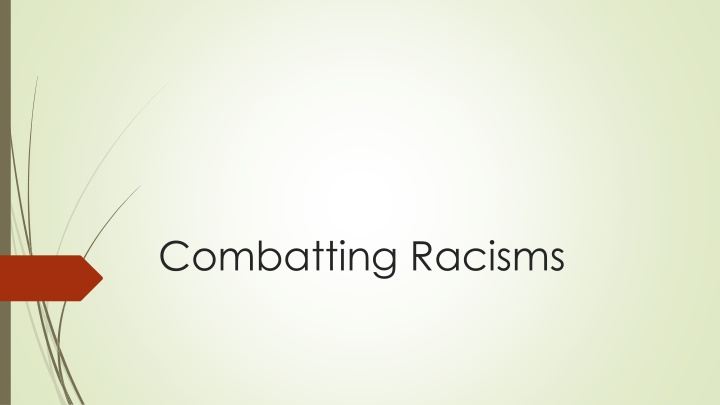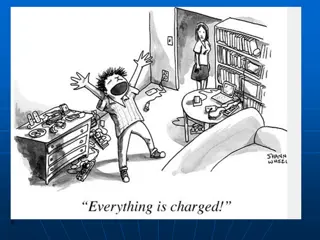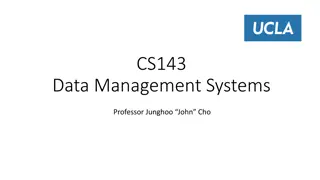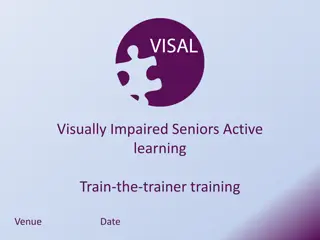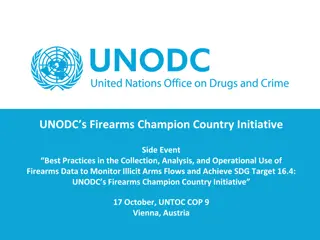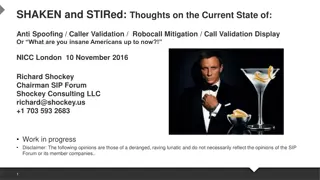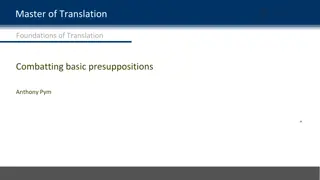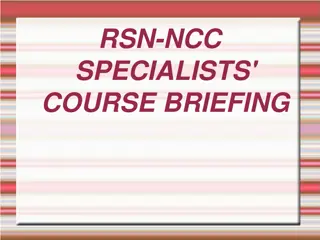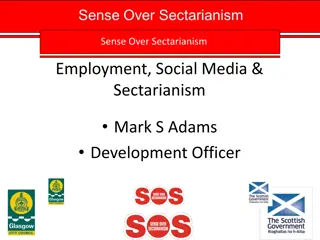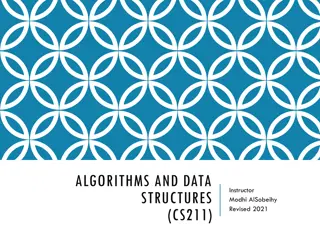Combatting Racisms Course Information with Professor Frankie Condon
This course explores historical and contemporary anti-racism practices, theories, and figures. Students will learn to identify and challenge racist structures in society and develop skills to address racism in personal and professional relationships. Through readings and discussions, students will engage with Critical Race Theory and anti-racism strategies to combat systemic racism. Office hours, lecture schedule, and required readings by Professor Frankie Condon are provided.
Download Presentation

Please find below an Image/Link to download the presentation.
The content on the website is provided AS IS for your information and personal use only. It may not be sold, licensed, or shared on other websites without obtaining consent from the author.If you encounter any issues during the download, it is possible that the publisher has removed the file from their server.
You are allowed to download the files provided on this website for personal or commercial use, subject to the condition that they are used lawfully. All files are the property of their respective owners.
The content on the website is provided AS IS for your information and personal use only. It may not be sold, licensed, or shared on other websites without obtaining consent from the author.
E N D
Presentation Transcript
course information Professor Frankie Condon (pronouns: she/her) Office Hours: T 3:00 5:00 in HH 147 or by appointment via zoom Lecture: Tuesday at 11:30 in AL 124 Discussion Group One Tues. 1:00 in AL 124 Discussion Group Two Thurs. 11:30 in RCH 205
course description This course examines historical and contemporary practices, theories, principles, figures, and allies of anti- racism. Students will learn methods of communicating and pursuing anti-racism in culture, society, and in personal and professional interracial relationships. Coursework will immerse students in recognizing language, behaviours, institutions, and discourses that maintain white supremacies and further enable racist policies and practices in North America. Students will be challenged to apply course material to real issues of racism in local contexts and communities.
learning objectives define racism and recognize its many forms understand the relationship between institutional and systemic power and racism recognize the differences and relationships between individual and collective forms of racism demonstrate basic familiarity with Critical Race Theory define anti-racism and recognize its many forms (tactical and strategic) design, refine, and deliver anti-racism training compose, revise, refine counterstory (CRT research method and genre)
required course readings: journals and book chapters available as pdfs on Learn Edugyan, Esi (2021). Canada and the Art of Ghosts. in Out of the Sun: On Race and Storytelling. Anansi Press. Joyce, S.J. Adrienna (2022). Am I a Settler?: Considering Dominance Through Racial Constructs and Land Relationships. Gebheard, McLean, and St. Denis, eds. White Benevolence: Racism and Colonial Violence in the Helping Professions. Fernwood Publishing. Patel, Saista and Nisha Nath (2022). What can Settler of Colour Teach Us? A Conversation of the Complexities of Decolonization in White Universities. Gebheard, McLean, and St. Denis, eds. White Benevolence: Racism and Colonial Violence in the Helping Professions. Fernwood Publishing. Stanley, Timothy J. (2022). Colten Boushie and the Deadly Articulations of Settler Colonialism: The Origins and Consequences of a Racist Discourse. Gebheard, McLean, and St. Denis, eds. White Benevolence: Racism and Colonial Violence in the Helping Professions. Fernwood Publishing.
required course readings: book-length Su, Derald Wing (2015). Race Talk and the Conspiracy of Silence: Understanding and Facilitating Difficult Dialogues. Wiley. This book is available in paperback, ePub, and PDF versions, any of which are acceptable. The University of Waterloo library has purchased rights to an e-version of the book so that, if you wish, you may access it free of charge.
Participation and Active Presence: 80 Points Midterm Mark: 20 Points Use Value + 20 Points Exchange Value = 40 End of Term Mark: 20 Points Use Value + 20 Points Exchange Value = 40 This is a class you really need to show up for! Even with lecture PowerPoints and lecture and reading notes from your classmates, you need to be present. Not only do you need to be physically present, but you also need to be intellectually, emotionally, and spiritually engaged! Now, that s a lot of exclamation marks, but this is very important not only to your learning and, hence, your success in the course but also to the learning and success of your classmates and me. Of course, we live in troubled times and things happen. We get sick (cuz COVID); our hearts need tending to; sometimes our people need us. Soooo I will give you three get-out-of-class free cards to use as you wish, without penalty, during the term (except workshop days both the ones I lead and the group facilitated ones). To use one of your cards, you may post a little note letting me know in the appropriate Dropbox folder BEFORE the class you will be missing. Notes posted after a missed class will NOT count. You don t have to explain just let me know. If you need to be away for more than three classes, there are two steps to take: First, schedule a zoom meeting with me to talk about what s going on and/or strategies for continuing your learning and maintaining your active presence in the course. Second, see below and do some of the alternative active presence projects. Aaand if you want bonus points to amp up your final grade in the course, at the end of each PowerPoint I post on our course Learn site, there will be an alternative active presence project. You may choose to do any or all of these and can submit them to the appropriate Dropbox folder any time before the end of the term. At both midterm and at the end of term, you will need to submit a use value reflection and mark to the appropriate Dropbox folder. For more information on what this means, please see the Grading section of this syllabus. Please note: if you submit a reflection without a mark, your grade for the assignment will default to 75%. If you do not submit either a reflection or a use value mark, your grade for the assignment will default to 70%. If you do not turn in the assignment, your grade will default to a 0.
Group Project: Anti-Racism Workshop Facilitation: 100 Points 50 Points Use Value + 50 Points Exchange Value = 100 For this assignment, you and your Discussion Group will design and facilitate an anti-racism workshop for the class. I will coach you through this process and the course readings and handouts will help as well. Your group will need to document its process and the contributions of each group member to the final workshop you lead. You will also need to turn in any visual materials (PowerPoints, handouts, etc.). You will find a Dropbox folder labeled for this purpose. All workshop materials and a minimum of FOUR weekly progress reports must be uploaded to the Dropbox folder in order for the members of your group to receive an exchange value mark. Individually, you will need to write a use value reflection and assign yourself a use value mark. Your use value reflection is due the day your group facilitates your workshop. For more information on what this means, please see the Grading section of this syllabus. Please note: if you submit a reflection without a mark, your grade for the assignment will default to 75%. If you do not submit either a reflection or a use value mark, your grade for the assignment will default to 70%. If you do not turn in the assignment, your grade will default to 0.
Counterstory: 80 40 Points Use Value + 40 Points Exchange Value You will need to compose, draft, revise, and polish a counterstory. You may choose to use composite characters and/or to write a dialogue or narrative. I will coach you through counterstory as research method and genre in critical race theory (CRT) as well as through the drafting, workshopping, revising, and polishing process. Your counterstory should be 8 10 pages (a little less if you ve said all you have to say or a little more if you need it is okay with me). You should use 12 point, Times New Roman Font and double space your work. You should include a works cited page and you may choose which citation style to follow so long as you employ a current version and apply it consistently. In addition to submitting your counterstory, you will also need to write and submit a use value reflection and assign yourself a use value mark. For more information on what this means, please see the Grading section of this syllabus. Please note: if you submit a reflection without a mark, your grade for the assignment will default to 75%. If you do not submit either a reflection or a use value mark, your grade for the assignment will default to 70%. If you do not turn in the assignment, your grade will default to a 0.
Lecture and Reading Notes: 40 20 Points Use Value + 20 Points Exchange Value You and your group will be composing lecture and reading notes throughout the term. You will post these in the Discussion section of our course Learn site so they are available for your classmates. You and your group members should share equitably the labour of producing these texts. Your lecture notes should be fulsome enough that if one of your classmates has to miss class, they can review them and gather a rich sense of what was discussed and its significance. Your reading notes should discuss the focus or subject of the assigned reading, name and define key concepts, and summarize conclusions or take-aways. Your group will need to document the sharing of labour, explaining the process by which you decided on an equitable distribution of the work among group members. As a group, you should submit this text to the appropriate Dropbox folder. You should also submit a copy of your reading and lecture notes to that Dropbox folder each Thursday beginning September 15. Individually, you will need to write and submit a use value reflection and mark on or before December 6. You will submit this individual text to the appropriate Dropbox folder. For more information on what this means, please see the Grading section of this syllabus. Please note: if you submit a reflection without a mark, your grade for the assignment will default to 75%. If you do not submit either a reflection or a use value mark, your grade for the assignment will default to 70%. If the group does not complete and upload reading and lecture notes, the grade of each group member will default to a 0.
grading description You may find my grading practice different than that of other professors. I am concerned that you engage deeply with the direction and design of your own learning, that you take an honest account of what you already know, what you want and need to learn, and how you plan to use each assignment to assist you in accomplishing that learning. For each of the above assignments, you will be asked to upload a use-value reflection describing your learning goals, the steps you took to craft an interpretation and enactment of the assignment that served your learning goals, where you thrived and where you may have struggled, and a final evaluation of your own work. You must include a use-value grade that you assign yourself for each assignment. You may not assign yourself either full marks or no marks for any assignment. I reserve the right to adjust your use-value mark if I feel you have either over- or under-estimated the value of your work. If you do not turn in a use value reflection and mark for any or all assignments but have completed the assignment, your mark will default to a 70%. If you turn in a reflection but no use value mark, your mark will default to a 75%.
TOTAL EXCHANGE VALUE ACTIVITY PER ITEM USE VALUE POINT S Participation and Active Presence 40 MID- 20 20 80 TERM 20 20 40 END OF TERM Anti-Racism Workshop Design and Facilitation NA 50 50 100 Counterstory NA 40 40 80 Lecture and Reading Notes NA 20 20 40 FINAL TOTAL 300 GRADING SUMMARY final grades will be calculated as a percentage of the total possible points.
rights and responsibilities
Reading and talking about racism is hard. However, the hardness of this work is not equally or equitably distributed across racial lines. All of us, irrespective of our racialization, are on a learning curve when it comes to racism, white supremacy, anti- racism, and anti-racist accomplice-ship. Each of us is likely to err and to fail not just once but many times throughout this term. However, the costs of our failures will not be equally or equitably distributed across racial lines. The hardness of this work and the costs of our failures are disproportionately born by Black, Indigenous, and Students of Colour. White discomfort is not the same thing as BIPOC pain and feeling uncomfortable as a white person is not a good reason to throw our hands up, walk away, stop listening, or go on the attack. White discomfort is a message and it s telling white folx to pause, breathe, listen still more deeply, engage in critical self-reflection, and STAY with and for those whose stories are hardest to hear because we are implicated in and by them We have to talk about racisms in order to talk about combatting racisms and learn to work at anti-racist communication and change agency. Talking about racism is not the same things as talking racist. What you read and we discuss in this class is for using for making actionable. Racist and other discriminatory language and behavior will not be tolerated.
Black, Indigenous, and Peoples of Colour are often placed in the position by white folx, by predominantly white institutions, and by white-dominated communities, society, and nations of having to do all or too much of the heavy lifting when it comes to anti-racism. These burdens can take the form of emotional, intellectual, and/or spiritual labour. Therefore, it is the responsibility of white students (and it is my responsibility as well) to carry some of that burden. It is also our responsibility to check that we are not overstepping, over-speaking, or overwhelming BIPOC students in the class. Although it can be frustrating to have to tell white folx to step back, step up, to listen better, or to yield the floor, the truth is we re probably going to need that from those of you who are Black, Indigenous, or Peoples of Colour sometimes. Silence is a powerful means of communication. You get to be silent when you need to be. And when you can or need to, you can tell the class to pause. You can tell us or folx in the class you trust what support you need and we ll make sure you get that. Nobody s got the whole story when it comes to racism and white supremacy and settler colonialism. Critical race theory and critical whiteness studies can help us understand, theorize, analyze, communicate, and transform our lived experience. Start the course from a place of belief, interest, engagement, commitment not in the importance and achievement of a good grade but in learning and doing the work of anti-racism. Start with humility and extend one another as much grace as you can without sacrificing honesty, integrity, and plain speaking.
university policies
Academic Integrity: In order to maintain a culture of academic integrity, members of the University of Waterloo are expected to promote honesty, trust, fairness, respect and responsibility. See the Office of Academic Integrity webpage for more information. Discipline: A student is expected to know what constitutes academic integrity to avoid committing an academic offence and to take responsibility for his/her actions. Check the Office of Academic Integrity for more information. A student who is unsure whether an action constitutes an offence, or who needs help in learning how to avoid offences (e.g., plagiarism, cheating) or about rules for group work/collaboration should seek guidance from the course professor, academic advisor, or the undergraduate associate dean. When misconduct has been found to have occurred, disciplinary penalties will be imposed under Policy 71 Student Discipline. For information on categories of offenses and types of penalties, students should refer to Policy 71 - Student Discipline. For typical penalties check Guidelines for the Assessment of Penalties. Grievance: A student who believes that a decision affecting some aspect of their university life has been unfair or unreasonable may have grounds for initiating a grievance. Read Policy 70 - Student Petitions and Grievances, Section 4. When in doubt, please be certain to contact the department s administrative assistant who will provide further assistance. Appeals : A decision made or penalty imposed under Policy 70 - Student Petitions and Grievances (other than a petition) or Policy 71 - Student Discipline may be appealed if there is a ground. A student who believes he/she has a ground for an appeal should refer to Policy 72 - Student Appeals.
Note for Students with Disabilities: AccessAbility Services, located in Needles Hall, Room 1401, collaborates with all academic departments to arrange appropriate accommodations for students with disabilities without compromising the academic integrity of the curriculum. If you require academic accommodations to lessen the impact of your disability, please register with AcessAbility Services at the beginning of each academic term. Turnitin.com: Some instructors use this plagiarism detection software. I do my own plagiarism detection and avoid Turnitin like the plague. If you want to know why, just ask. Cross-listed Course: Please note that a cross-listed course will count in all respective averages no matter under which rubric it has been taken. For example, a PHIL/PSCI cross- list will count in a Philosophy major average, even if the course was taken under the Political Science rubric.
